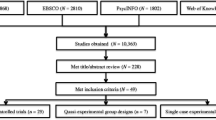Abstract
Young children’s challenging behavior can impact all aspects of the classroom environment, including relationships (peer–peer, student–teacher), learning, and safety. Positive Behavior Interventions and Supports (PBIS) is a program that focuses on supporting pro-social behaviors and preventing challenging behavior. PBIS begins with building a foundation of universal practices and creating a common language that teachers, children, and families can use to talk about behavior. The identification and defining of appropriate behavioral expectations and the systematic teaching of those behavioral expectations is paramount to preventing challenging behavior. This article describes the steps involved in identifying classroom behavioral expectations and the development of developmentally appropriate lesson plans to teach those behaviors to young children.
Similar content being viewed by others
References
Alkon, A., Ramler, M., & MacLennan, K. (2003). Evaluation of mental health consultation in child care centers. Early Childhood Education Journal, 31, 91–99.
Benedict, E. A., Horner, R. H., & Squires, J. (2007). Assessment and implementation of positive behavior support in preschools. Topics in Early Childhood Special Education, 27, 174–192.
Fox, L., & Hemmeter, M. L. (2009). A program-wide model for supporting social emotional development and addressing challenging behavior in early childhood settings. In W. Sailor, G. Dunlap, G. Sugai, & R. Horner (Eds.), Handbook of positive behavior support (pp. 177–202). New York, NY: Springer.
Horner, R. H. (2000). Positive behavior supports. In M. L. Wehmeyer & J. R. Patton (Eds.), Mental retardation in the 21st century (pp. 181–196). Austin, TX: Pro-Ed.
Joseph, G. E., & Strain, P. S. (2003). Comprehensive evidence-based social-emotional curricula for young children: An analysis of efficacious adoption potential. Topics in Early Childhood Special Education, 23(2), 65–76.
Powell, D., & Dunlap, G. (2006). Mental health services for young children. In R. G. Steele & M. C. Roberts (Eds.), Handbook of mental health services for children, adolescents and families. New York, NY: Kluwer Academic/Plenum Publishers.
Stormont, M., Lewis, T. J., & Beckner, R. (2005). Positive behavior support systems: Applying key features in preschool settings. Teaching Exceptional Children, 37(6), 42–49.
Willoughby, M., Kupersmidt, J., & Bryant, D. (2001). Overt and cover dimensions of antisocial behavior in early childhood. Journal of Abnormal Clinical Psychology, 29(3), 177–187.
Author information
Authors and Affiliations
Corresponding author
Rights and permissions
About this article
Cite this article
Carter, D.R., Pool, J.L. Appropriate Social Behavior: Teaching Expectations to Young Children. Early Childhood Educ J 40, 315–321 (2012). https://doi.org/10.1007/s10643-012-0516-y
Published:
Issue Date:
DOI: https://doi.org/10.1007/s10643-012-0516-y




